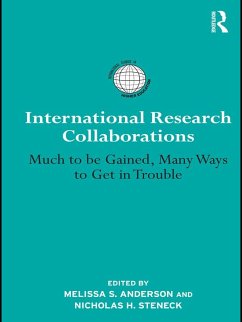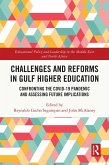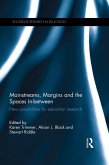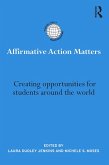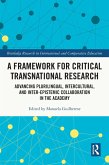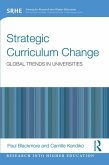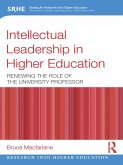International Research Collaborations (eBook, ePUB)
Much to be Gained, Many Ways to Get in Trouble
Redaktion: Anderson, Melissa S.; Steneck, Nicholas H.
56,95 €
56,95 €
inkl. MwSt.
Sofort per Download lieferbar

28 °P sammeln
56,95 €
Als Download kaufen

56,95 €
inkl. MwSt.
Sofort per Download lieferbar

28 °P sammeln
Jetzt verschenken
Alle Infos zum eBook verschenken
56,95 €
inkl. MwSt.
Sofort per Download lieferbar
Alle Infos zum eBook verschenken

28 °P sammeln
International Research Collaborations (eBook, ePUB)
Much to be Gained, Many Ways to Get in Trouble
Redaktion: Anderson, Melissa S.; Steneck, Nicholas H.
- Format: ePub
- Merkliste
- Auf die Merkliste
- Bewerten Bewerten
- Teilen
- Produkt teilen
- Produkterinnerung
- Produkterinnerung

Bitte loggen Sie sich zunächst in Ihr Kundenkonto ein oder registrieren Sie sich bei
bücher.de, um das eBook-Abo tolino select nutzen zu können.
Hier können Sie sich einloggen
Hier können Sie sich einloggen
Sie sind bereits eingeloggt. Klicken Sie auf 2. tolino select Abo, um fortzufahren.

Bitte loggen Sie sich zunächst in Ihr Kundenkonto ein oder registrieren Sie sich bei bücher.de, um das eBook-Abo tolino select nutzen zu können.
Part of the International Studies in Higher Education series, International Research Collaborations considers what can go wrong in cross-national collaborations, and how scientists can avoid these problems.
- Geräte: eReader
- mit Kopierschutz
- eBook Hilfe
- Größe: 0.49MB
Andere Kunden interessierten sich auch für
![The Routledge International Handbook of Universities, Security and Intelligence Studies (eBook, ePUB) The Routledge International Handbook of Universities, Security and Intelligence Studies (eBook, ePUB)]() The Routledge International Handbook of Universities, Security and Intelligence Studies (eBook, ePUB)45,95 €
The Routledge International Handbook of Universities, Security and Intelligence Studies (eBook, ePUB)45,95 €![Challenges and Reforms in Gulf Higher Education (eBook, ePUB) Challenges and Reforms in Gulf Higher Education (eBook, ePUB)]() Challenges and Reforms in Gulf Higher Education (eBook, ePUB)41,95 €
Challenges and Reforms in Gulf Higher Education (eBook, ePUB)41,95 €![Mainstreams, Margins and the Spaces In-between (eBook, ePUB) Mainstreams, Margins and the Spaces In-between (eBook, ePUB)]() Mainstreams, Margins and the Spaces In-between (eBook, ePUB)47,95 €
Mainstreams, Margins and the Spaces In-between (eBook, ePUB)47,95 €![Affirmative Action Matters (eBook, ePUB) Affirmative Action Matters (eBook, ePUB)]() Affirmative Action Matters (eBook, ePUB)56,95 €
Affirmative Action Matters (eBook, ePUB)56,95 €![A Framework for Critical Transnational Research (eBook, ePUB) A Framework for Critical Transnational Research (eBook, ePUB)]() A Framework for Critical Transnational Research (eBook, ePUB)41,95 €
A Framework for Critical Transnational Research (eBook, ePUB)41,95 €![Strategic Curriculum Change in Universities (eBook, ePUB) Strategic Curriculum Change in Universities (eBook, ePUB)]() Paul BlackmoreStrategic Curriculum Change in Universities (eBook, ePUB)39,95 €
Paul BlackmoreStrategic Curriculum Change in Universities (eBook, ePUB)39,95 €![Intellectual Leadership in Higher Education (eBook, ePUB) Intellectual Leadership in Higher Education (eBook, ePUB)]() Bruce MacfarlaneIntellectual Leadership in Higher Education (eBook, ePUB)37,95 €
Bruce MacfarlaneIntellectual Leadership in Higher Education (eBook, ePUB)37,95 €-
-
-
Part of the International Studies in Higher Education series, International Research Collaborations considers what can go wrong in cross-national collaborations, and how scientists can avoid these problems.
Dieser Download kann aus rechtlichen Gründen nur mit Rechnungsadresse in A, B, BG, CY, CZ, D, DK, EW, E, FIN, F, GR, HR, H, IRL, I, LT, L, LR, M, NL, PL, P, R, S, SLO, SK ausgeliefert werden.
Produktdetails
- Produktdetails
- Verlag: Taylor & Francis eBooks
- Seitenzahl: 312
- Erscheinungstermin: 22. November 2011
- Englisch
- ISBN-13: 9781136951619
- Artikelnr.: 42510190
- Verlag: Taylor & Francis eBooks
- Seitenzahl: 312
- Erscheinungstermin: 22. November 2011
- Englisch
- ISBN-13: 9781136951619
- Artikelnr.: 42510190
- Herstellerkennzeichnung Die Herstellerinformationen sind derzeit nicht verfügbar.
Melissa S. Anderson, PhD., is Professor of Higher Education and an affiliate faculty member in bioethics at the University of Minnesota, where she also chairs the University's Senate Research Committee. Nicholas H. Steneck, PhD., is Director of the Research Ethics and Integrity Program of the Michigan Institute for Clinical and Health Research and Professor Emeritus of History at the University of Michigan.
Part I. International Research Collaborations
1. What Can Be Gained and What Can Go Wrong in the Context of Different
National Research Environments, Melissa S. Anderson
2. Research Integrity in the Context of Global Cooperation, Nicholas H.
Steneck
3. Considerations Upon Setting Out to Collaborate Internationally, F. Gray
Handley
Part II. Differences in the Organization and Funding of Research
4. National Variations in the Organization of Scientific Research, David W.
Chapman, Ingo Stolz, and Olena Glushko
5. Evolution of National Funding Systems for Research, Tony Mayer
6. National Systems for Scientific Research in China, Ping Sun
Part III. Differences in Legal and Normative Environments
7. Legal and Regulatory Considerations in International Research
Collaborations, Mark A. Bohnhorst, Meredith McQuaid, Stacey R. Bolton
Tsantir, Donald M. Amundson, and Melissa S. Anderson
8. The Governance of Scientific Collaborations: The International Reach of
U.S. Law, Alexander M. Capron
9. Normative Environments of International Science, Raymond G. De Vries,
Leslie M. Rott, and Yasaswi Paruchuri
Part IV. Differences in Regulatory and Publication Oversight
10. International Cooperation to Ensure Scientific Integrity, Christine C.
Boesz and Peggy L. Fischer
11. Scientific Integrity in the Context of Pan-European Cooperation, Andrew
C. Stainthorpe
12. Collaborating with Colleagues in Latin America: Publication Issues,
Herbert Stegemann, Juan Miyahira, Sergio Alvarado-Menacho, and Reyna M.
Durón
Part V. Differences in Graduate Education and Postdoctoral Training
13. Differences in National Approaches to Doctoral Education: Implications
for International Research Collaborations, Melissa S. Anderson, Felly
Chiteng Kot, Yiyun Jie, Takehito Kamata, Aliya Kuzhabekova, Christine C.
Lepkowski, Marta A. Shaw, Martha M. Sorenson, and Sonia M. R. Vasconcelos
14. The Emergence of International Postdoctoral Training, John B. Godfrey
15. Preparing Students to Navigate Cross-National Differences in the
Research Environment: The Role of Research-Integrity Education, Elizabeth
Heitman and JuLeigh Petty
Part VI. Toward Successful International Research Collaborations
16. Proactive and Reactive Approaches to Facilitating International
Collaborations, Camille Nebeker
17. Balancing Research Collaborations with the Realities of Working with
Industry: Lessons from the Biotechnology Realm, Stewart Lyman
18. Realizing Gains and Staying Out of Trouble, Melissa S. Anderson and
Nicholas H. Steneck
Appendix
Egypt, Interview with Ibrahim Adib Abdel-Messih
India, Prem Pais, Denis Xavier, and Kumar G. Belani
Singapore and China, Interview with James O. Leckie, Toward Successful
International Research Collaborations
Contributor Biographies
1. What Can Be Gained and What Can Go Wrong in the Context of Different
National Research Environments, Melissa S. Anderson
2. Research Integrity in the Context of Global Cooperation, Nicholas H.
Steneck
3. Considerations Upon Setting Out to Collaborate Internationally, F. Gray
Handley
Part II. Differences in the Organization and Funding of Research
4. National Variations in the Organization of Scientific Research, David W.
Chapman, Ingo Stolz, and Olena Glushko
5. Evolution of National Funding Systems for Research, Tony Mayer
6. National Systems for Scientific Research in China, Ping Sun
Part III. Differences in Legal and Normative Environments
7. Legal and Regulatory Considerations in International Research
Collaborations, Mark A. Bohnhorst, Meredith McQuaid, Stacey R. Bolton
Tsantir, Donald M. Amundson, and Melissa S. Anderson
8. The Governance of Scientific Collaborations: The International Reach of
U.S. Law, Alexander M. Capron
9. Normative Environments of International Science, Raymond G. De Vries,
Leslie M. Rott, and Yasaswi Paruchuri
Part IV. Differences in Regulatory and Publication Oversight
10. International Cooperation to Ensure Scientific Integrity, Christine C.
Boesz and Peggy L. Fischer
11. Scientific Integrity in the Context of Pan-European Cooperation, Andrew
C. Stainthorpe
12. Collaborating with Colleagues in Latin America: Publication Issues,
Herbert Stegemann, Juan Miyahira, Sergio Alvarado-Menacho, and Reyna M.
Durón
Part V. Differences in Graduate Education and Postdoctoral Training
13. Differences in National Approaches to Doctoral Education: Implications
for International Research Collaborations, Melissa S. Anderson, Felly
Chiteng Kot, Yiyun Jie, Takehito Kamata, Aliya Kuzhabekova, Christine C.
Lepkowski, Marta A. Shaw, Martha M. Sorenson, and Sonia M. R. Vasconcelos
14. The Emergence of International Postdoctoral Training, John B. Godfrey
15. Preparing Students to Navigate Cross-National Differences in the
Research Environment: The Role of Research-Integrity Education, Elizabeth
Heitman and JuLeigh Petty
Part VI. Toward Successful International Research Collaborations
16. Proactive and Reactive Approaches to Facilitating International
Collaborations, Camille Nebeker
17. Balancing Research Collaborations with the Realities of Working with
Industry: Lessons from the Biotechnology Realm, Stewart Lyman
18. Realizing Gains and Staying Out of Trouble, Melissa S. Anderson and
Nicholas H. Steneck
Appendix
Egypt, Interview with Ibrahim Adib Abdel-Messih
India, Prem Pais, Denis Xavier, and Kumar G. Belani
Singapore and China, Interview with James O. Leckie, Toward Successful
International Research Collaborations
Contributor Biographies
Part I. International Research Collaborations
1. What Can Be Gained and What Can Go Wrong in the Context of Different
National Research Environments, Melissa S. Anderson
2. Research Integrity in the Context of Global Cooperation, Nicholas H.
Steneck
3. Considerations Upon Setting Out to Collaborate Internationally, F. Gray
Handley
Part II. Differences in the Organization and Funding of Research
4. National Variations in the Organization of Scientific Research, David W.
Chapman, Ingo Stolz, and Olena Glushko
5. Evolution of National Funding Systems for Research, Tony Mayer
6. National Systems for Scientific Research in China, Ping Sun
Part III. Differences in Legal and Normative Environments
7. Legal and Regulatory Considerations in International Research
Collaborations, Mark A. Bohnhorst, Meredith McQuaid, Stacey R. Bolton
Tsantir, Donald M. Amundson, and Melissa S. Anderson
8. The Governance of Scientific Collaborations: The International Reach of
U.S. Law, Alexander M. Capron
9. Normative Environments of International Science, Raymond G. De Vries,
Leslie M. Rott, and Yasaswi Paruchuri
Part IV. Differences in Regulatory and Publication Oversight
10. International Cooperation to Ensure Scientific Integrity, Christine C.
Boesz and Peggy L. Fischer
11. Scientific Integrity in the Context of Pan-European Cooperation, Andrew
C. Stainthorpe
12. Collaborating with Colleagues in Latin America: Publication Issues,
Herbert Stegemann, Juan Miyahira, Sergio Alvarado-Menacho, and Reyna M.
Durón
Part V. Differences in Graduate Education and Postdoctoral Training
13. Differences in National Approaches to Doctoral Education: Implications
for International Research Collaborations, Melissa S. Anderson, Felly
Chiteng Kot, Yiyun Jie, Takehito Kamata, Aliya Kuzhabekova, Christine C.
Lepkowski, Marta A. Shaw, Martha M. Sorenson, and Sonia M. R. Vasconcelos
14. The Emergence of International Postdoctoral Training, John B. Godfrey
15. Preparing Students to Navigate Cross-National Differences in the
Research Environment: The Role of Research-Integrity Education, Elizabeth
Heitman and JuLeigh Petty
Part VI. Toward Successful International Research Collaborations
16. Proactive and Reactive Approaches to Facilitating International
Collaborations, Camille Nebeker
17. Balancing Research Collaborations with the Realities of Working with
Industry: Lessons from the Biotechnology Realm, Stewart Lyman
18. Realizing Gains and Staying Out of Trouble, Melissa S. Anderson and
Nicholas H. Steneck
Appendix
Egypt, Interview with Ibrahim Adib Abdel-Messih
India, Prem Pais, Denis Xavier, and Kumar G. Belani
Singapore and China, Interview with James O. Leckie, Toward Successful
International Research Collaborations
Contributor Biographies
1. What Can Be Gained and What Can Go Wrong in the Context of Different
National Research Environments, Melissa S. Anderson
2. Research Integrity in the Context of Global Cooperation, Nicholas H.
Steneck
3. Considerations Upon Setting Out to Collaborate Internationally, F. Gray
Handley
Part II. Differences in the Organization and Funding of Research
4. National Variations in the Organization of Scientific Research, David W.
Chapman, Ingo Stolz, and Olena Glushko
5. Evolution of National Funding Systems for Research, Tony Mayer
6. National Systems for Scientific Research in China, Ping Sun
Part III. Differences in Legal and Normative Environments
7. Legal and Regulatory Considerations in International Research
Collaborations, Mark A. Bohnhorst, Meredith McQuaid, Stacey R. Bolton
Tsantir, Donald M. Amundson, and Melissa S. Anderson
8. The Governance of Scientific Collaborations: The International Reach of
U.S. Law, Alexander M. Capron
9. Normative Environments of International Science, Raymond G. De Vries,
Leslie M. Rott, and Yasaswi Paruchuri
Part IV. Differences in Regulatory and Publication Oversight
10. International Cooperation to Ensure Scientific Integrity, Christine C.
Boesz and Peggy L. Fischer
11. Scientific Integrity in the Context of Pan-European Cooperation, Andrew
C. Stainthorpe
12. Collaborating with Colleagues in Latin America: Publication Issues,
Herbert Stegemann, Juan Miyahira, Sergio Alvarado-Menacho, and Reyna M.
Durón
Part V. Differences in Graduate Education and Postdoctoral Training
13. Differences in National Approaches to Doctoral Education: Implications
for International Research Collaborations, Melissa S. Anderson, Felly
Chiteng Kot, Yiyun Jie, Takehito Kamata, Aliya Kuzhabekova, Christine C.
Lepkowski, Marta A. Shaw, Martha M. Sorenson, and Sonia M. R. Vasconcelos
14. The Emergence of International Postdoctoral Training, John B. Godfrey
15. Preparing Students to Navigate Cross-National Differences in the
Research Environment: The Role of Research-Integrity Education, Elizabeth
Heitman and JuLeigh Petty
Part VI. Toward Successful International Research Collaborations
16. Proactive and Reactive Approaches to Facilitating International
Collaborations, Camille Nebeker
17. Balancing Research Collaborations with the Realities of Working with
Industry: Lessons from the Biotechnology Realm, Stewart Lyman
18. Realizing Gains and Staying Out of Trouble, Melissa S. Anderson and
Nicholas H. Steneck
Appendix
Egypt, Interview with Ibrahim Adib Abdel-Messih
India, Prem Pais, Denis Xavier, and Kumar G. Belani
Singapore and China, Interview with James O. Leckie, Toward Successful
International Research Collaborations
Contributor Biographies
